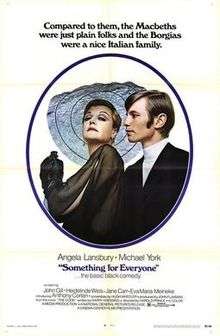Something for Everyone
Something for Everyone is a 1970 American black comedy film starring Angela Lansbury, Michael York, Anthony Higgins, and Jane Carr.
| Something for Everyone | |
|---|---|
 original theatrical poster | |
| Directed by | Harold Prince |
| Produced by | John Flaxman |
| Screenplay by | Hugh Wheeler |
| Based on | The Cook by Harry Kressing |
| Starring | Angela Lansbury Michael York Anthony Higgins Jane Carr Heidelinde Weis |
| Music by | John Kander |
| Cinematography | Walter Lassally |
Production company | |
| Distributed by | National General Pictures |
Release date |
|
Running time | 112 minutes |
| Country | United States |
| Language | English |
The film was based on the novel The Cook by Harry Kressing, with a screenplay by Hugh Wheeler. The plot to the film is quite different from the novel. Directed by Harold Prince (in his feature directorial debut) for Cinema Center Films, the film began shooting on 30 June 1969[1] and was originally released by National General Pictures in July 1970. Lansbury was nominated for the Golden Globe Award for Best Actress – Motion Picture Musical or Comedy.
In the UK, the film was retitled Black Flowers for the Bride (subtitle: A Comedy of Evil) and released in May 1971.[2] In 1986 and 1990, a VHS[3] of the film was issued followed by DVD and Blu-ray[4] on 6 December 2016.
Plot
A handsome young stranger, Konrad Ludwig, is fascinated by a castle near the Bavarian village of Ornstein. He dreams of owning and living in the castle, which is the property of widowed countess Herthe von Ornstein, who lives in the dower house, unable financially to open and live in her castle.
As Konrad schemes to become one of the countess's servants, he romances a beautiful and wealthy young lady, Anneliese Pleschke, daughter of a nouveau riche couple. The idea is to use their wealth to reopen castle Ornstein. After an afternoon of chauffeuring the Pleschkes around the countryside, he gets Rudolph, the countess's footman, drunk at the local Biergarten and then run over by a train. Konrad then takes Rudolph's place in the countess's household.
Helmuth von Ornstein, a shy and attractive young man, and Lotte von Ornstein, a plain and annoying girl, are the countess's children. Helmuth is gay and begins to be romanced by Konrad when the stern majordomo, Klaus, tries to put a stop to it by firing Konrad. Klaus, though, has a scandalous secret: his father was a Nazi colonel, whose memory is fondly enshrined in Klaus's bedroom. The mayor of Ornstein is militantly disposed to root out all Nazis remaining in Germany, and Konrad tells him about Klaus, who is summarily and quietly put out of the countess's employ. Konrad is free to be Helmuth's lover while taking Klaus's place as majordomo.
Konrad now plays up to the countess, encouraging her to throw a daring, expensive party at the dower house in order to initiate a pseudo romance between Helmuth and Anneliese Pleschke. Konrad, the lover of both Helmuth and Anneliese, induces them to become engaged to each other, while secretly assuring both of them that he would always be there at the castle. When the marriage contract is signed, the Pleschke money flows in to reopen and refurbish the castle Ornstein.
The marriage takes place, but the honeymoon is a disaster with both the bride and groom wanting an annulment. The demise of the grand design is hastened along by Anneliese, who walks in on Konrad and Helmuth kissing. Anneliese, shocked and speechless, is ushered to the limousine in which she and her parents are to be driven to the castle by Konrad. When Anneliese hysterically opens up to her parents, Konrad turns the limousine down a steep embankment, managing to jump out before it crashes, killing Anneliese and her parents. Konrad escapes with a broken leg.
Konrad goes through a pleasant convalescence with the countess herself becoming his new romantic interest. After an amorous night in the countess's boudoir, they plan to be married. Helmuth is devastated. He reluctantly allows the marriage to go on rather than have Konrad be forced to leave by a scorned countess.
Helmuth's sister Lotte has other plans. On the eve of the wedding she informs Konrad that she knows all about his murderous and scandalous exploits. Ingeniously she avoids being Konrad's next victim and has him marry her instead of her mother.
Cast
- Angela Lansbury as countess Herthe von Ornstein
- Michael York as Konrad Ludwig
- Anthony Higgins as Helmuth von Ornstein (billed as Anthony Corlan)
- Jane Carr as Lotte von Ornstein
- Heidelinde Weis as Anneliese Pleschke
- Wolfried Lier as Klaus
- Despo Diamantidou as Bobby (billed as Despo)
- John Gill as Herr Pleschke
- Eva Maria Meineke as Frau Pleschke
- Klaus Havenstein as Rudolph
- Walter Janssen as Father Georg
See also
References
- "Something for Everyone (1970)". Ftvdb.bfi.org.uk. Archived from the original on January 29, 2009. Retrieved October 23, 2017.
- Films in London volume 3 number 52, 30 May-12 June 1971
- Something for everyone. October 23, 1986. OCLC 15743328.
- "Something for Everyone Blu-ray". Blu-ray.com. Retrieved October 23, 2017.